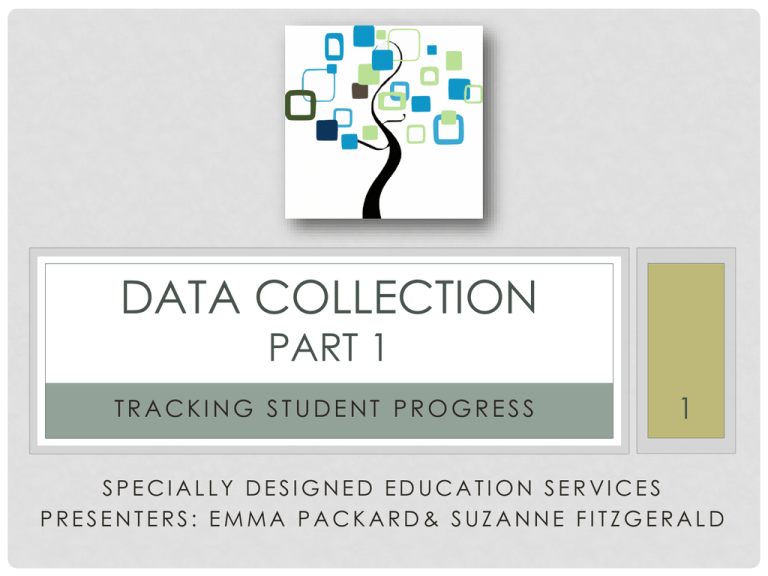
DATA COLLECTION
PART 1
TRACKING STUDENT PROGRESS
1
SPECIALLY DESIGNED EDUCATION SERVICES
PRESENTERS: EMMA PACKARD& SUZANNE FITZGERALD
OBJECTIVES
After completing this session,
participants will be able to:
• Identify why data should be taken.
• Determine what to take data on.
• Determine when and how data should be
taken.
• Identify the components needed to
create an effective data sheet.
2
POLL
• How many of you are currently taking
data on all student IEP goals?
3
WHY COLLECT DATA
To evaluate student progress
• Determine accuracy
• Program changes
•
Move on
•
Step back
4
5
6
SDES
Copyright © 2005, Fitzgerald & Packard Part of a larger work in progress
7
WHY COLLECT DATA
For IEP documentation
and accountability
• Program consistency
• Progress reporting
• PLOP
8
WHY COLLECT DATA
Program consistency
9
WHY COLLECT DATA
To create a confident team environment
10
WHY COLLECT DATA
To keep parents informed and to
encourage involvement
11
WHY COLLECT DATA
As documentation for doctors, therapists
and specialists.
12
13
14
WHAT TO COLLECT DATA ON
• Ideally – any and everything!
• Realistically – critical programs.
15
WHAT TO COLLECT DATA ON
• Urgent issues
• IEP goals
• Ask yourself, “Why am I teaching
and taking data on this?” and “Is
this functional?”
16
WHAT TO COLLECT DATA ON
Our General Guidelines:
• What skills do my students need in order to
be as independent AS POSSIBLE both now
and in the future?
• Is this skill functional and meaningful?
• Is this a skill that they will encounter on a
regular basis and will be able to learn,
practice, and generalize?
17
WHAT TO COLLECT DATA ON
Our General Guidelines:
• Is this skill age-appropriate?
• How will this skill increase my student’s quality
of life?
• Am I evaluating and adjusting student
programs frequently?
18
POLL
• What skills are you teaching your
individual students?
19
POLL
• What criteria/guidelines do you use to
determine which skills to teach?
20
WHEN & HOW OFTEN
• Take data consistently and
frequently.
• Take data on a set number of trials.
21
TYPES OF DATA
• Accuracy
• Fluency
• Latency/Duration
• Frequency
22
COMPONENTS OF AN
EFFECTIVE DATA SHEET
• Student name or initials
• Program
• Date
• Staff initials
• Comments/notes section
• Teacher directed prompt
• Key
23
COMPONENTS OF AN
EFFECTIVE DATA SHEET
• A place to record:
• Accuracy
• Correct or incorrect responses
• Latency/Duration
• Time
• Fluency
• Time
• Prompts
• Frequency
24
EXAMPLES
25
ROUTINE DATA SHEETS
26
SDES
Copyright © 2005, Fitzgerald & Packard Part of a larger work in progress
27
SDES
Copyright © 2005, Fitzgerald & Packard Part of a larger work in progress
28
USING A SCHEDULE
29
SDES
Copyright © 2005, Fitzgerald & Packard Part of a larger work in progress
30
SDES
Copyright © 2005, Fitzgerald & Packard Part of a larger work in progress
31
INITIATING COMMUNICATION
32
SDES
Copyright © 2005, Fitzgerald & Packard Part of a larger work in progress
33
SDES
Copyright © 2005, Fitzgerald & Packard Part of a larger work in progress
34
INDEPENDENCE
35
SDES
Copyright © 2005, Fitzgerald & Packard Part of a larger work in progress
36
SDES
Copyright © 2005, Fitzgerald & Packard Part of a larger work in progress
37
BEHAVIOR
38
SDES
Copyright © 2005, Fitzgerald & Packard Part of a larger work in progress
39
SDES
Copyright © 2005, Fitzgerald & Packard Part of a larger work in progress
40
MODIFY YOUR DATA SHEETS
Easily adapt your data sheets to meet
the individual needs of your students.
41
Copyright © 2013, Candice Styer and Suzanne Fitzgerald, All Rights Reserved
42
Copyright © 2013, Candice Styer and Suzanne Fitzgerald, All Rights Reserved
43
44
45
HOMEWORK
• Using a student IEP, target one goal to
develop a data sheet for.
• Send a copy of the data sheet and
the goal (with student information
redacted) to
suzanne.fitzgerald@styer-fitzgerald.com
or ebpackard@msn.com
by November 14th.
46
QUESTIONS
47
RESOURCES
•
Teachers Pay Teachers
•
Show ME the Data!: Data-Based Instructional Decisions
Made Simple and Easy by RinaMarie Leon-Guerrero,
Chris Matsumoto and Jaime Martin
•
www.google.com – Search images for behavior charts
•
www.styer-fitzgerald.com – The Styer-Fitzgerald Program
for Functional Academics
•
Specially Designed Education Services (SDES)
Suzanne Fitzgerald & Emma Packard
suzanne.fitzgerald@styer-fitzgerald.com
ebpackard@msn.com
48










